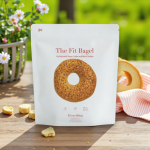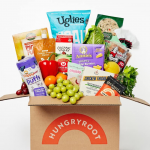Investors Bet on Banza with $1.3M Investment
Chickpea pasta producer Banza announced this week that the company had completed its first seed round of a $1.3 million dollar raise from institutional and angel investors. The investment came as the company has enjoyed a monster year of sales and an expanded set of retailers
Only a little over a year ago, Banza co-founder Brian Rudolph dreamed up the pasta recipe in his home kitchen. Inspired by the idea of creating a high protein, low-carb, gluten free pasta, Rudolph raised funds to get the fledgling company off the ground via a successful crowdfunding campaign and prize money from a pitch contest sponsored by Venture for America, a national fellowship program that helps entrepreneurs launch their careers in emerging cities.
Rudolph and his co-founder (and brother) Scott were then selected to appear on Restaurant Startup, a CNBC produced contest show. Although they struggled with texture, taste and timing issues, Banza won an investment from Joe Bastianich, a well-known Italian food magnate.. While the funds were helpful, the resulting press also helped draw attention to the product line.
Now the pasta line is sold in over 1,700 stores nationwide, including Whole Foods Market, HEB, Wegmans, Kroger and more. The Rudolphs have worked out kinks with the product, and released Banza 2.0, which went on to earn them last year’s Natural Products Expo East NEXTY Award (People’s Choice).
Compared to a serving of traditional pasta, Banza has two times the protein, four times the fiber, almost half as many net carbs and a much lower glycemic index. The product also has an environmentally friendly point of differentiation: it takes half as much water to produce a gram of protein from chickpeas as it does to product a gram of protein from chicken. Banza claims “if every American swapped out one serving of chicken per week for one serving of Banza it would the equivalent of taking nearly 500,000 cars off the road in CO2 emissions.”
In an interview with Project NOSH, Brian Rudolph said that the funding would “go towards working capital. So as we continue to get into new stores, it’s just making sure that we can build inventory to fulfill these larger orders that we’re signing.”
Part of the need for this capital, Rudolph said, is because “we have really been expanding quickly. We went from this time last year from being in two stores to now being in 1700. It’s been a quick start and we’re doing everything we can to continue to be able to support stores.” The bulk of their retailers have been added only in the last six months, Rudolph said
The company is also close to releasing two new products, a macaroni and cheese and a spaghetti, both chickpea based. Rudolph told NOSH that longer term, “our ambitions are extremely large. We want to change the way people think about pasta. We want to do for pasta what Chobani did for yogurt.” The theme for Banza’s future plans, he said, is about “taking the foods that people love and making them better by using better ingredients.”
The investors, Rudolph said, are varied. They include Robin Chan (a tech entrepreneur and an early stage investor in Twitter, Square and Foursquare), Vayner/RSE Wine (a fund between Gary Vaynerchuk, VaynerMedia and RSE Ventures that has invested in everything from Birchbox to Medium to Dizly) and Sara Levinson (former president of NFL Properties, MTV Networks and Rodale’s Women’s Group). Perhaps in the greatest show of support, Bastianich doubled down and invested a second time.
In a press release, Matt Higgins, partner at Vayner/RSE, said, “Banza has the potential to change the way millions of people eat, and has the team behind it dedicated to making it happen.” Rudolph told NOSH that the varied experience their investors bring to the table will be instrumental to the company’s success.
The company, located in Detroit, is part of a renaissance of young entrepreneurs who want to bring a vibrant business climate back to the long-depressed “Rock City.”
The business is running contrary to the downward trend in the pasta business. According to market research firm Euromonitor, which notes that in North America, sales of dried pasta fell by six percent between 2009 and 2014.
But Banza is poised for success as a pasta that’s at the intersection of key food trends — the low-carb/gluten-free movements as well as the emphasis on consuming higher protein options, notes Rudolph, who said that “Banza is the solution to pasta’s problem.”



















